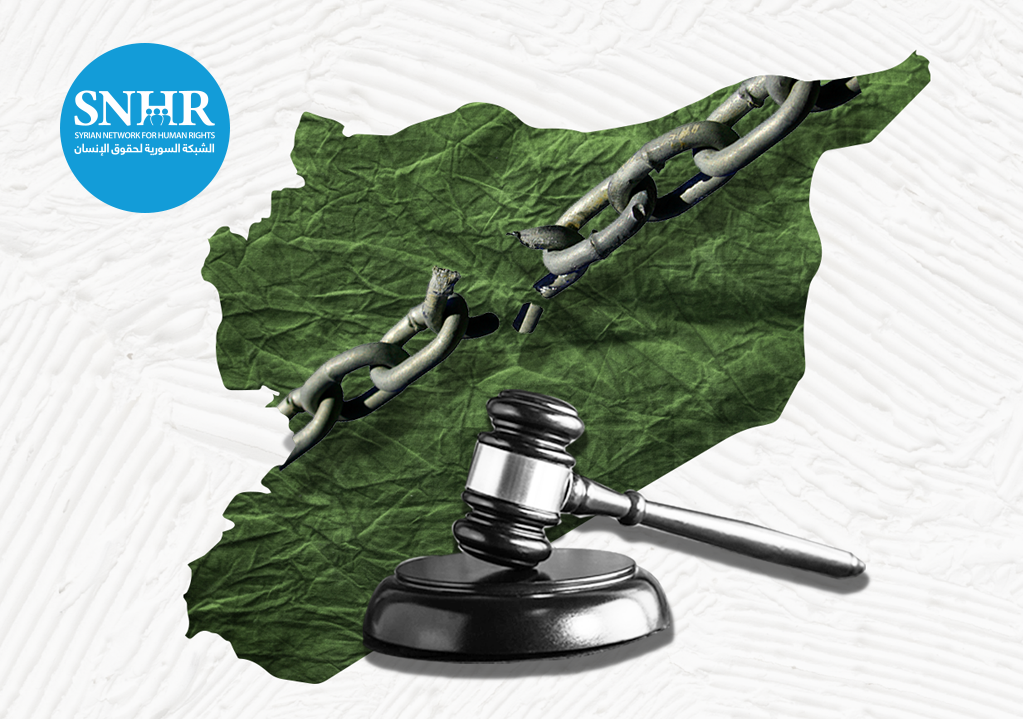The Economic and Political Sanctions Were Associated With the Deposed Assad Regime’s Crimes Against Humanity and War Crimes

Available In
The Hague – The Syrian Network for Human Rights (SNHR) today released a statement noting that the economic and political sanctions imposed on the former Assad regime were associated with the crimes against humanity and war crimes committed by the regime since March 2011. The statement adds that these economic and political sanctions were unilaterally imposed by the United States and the European Union, as well as other states, in light of the UN Security Council’s failure to put an end to these crimes. In this context, these sanctions were viewed as a way to make amends for this failure, and as instruments to hold the Assad regime accountable, with the aim of applying pressure to compel the regime to change its criminal behavior and agree to a political solution.
Moreover, the statement notes that SNHR supported the utilization of sanctions as a tool against the Assad regime, especially against those regime-affiliated individuals implicated in grave violations. The group has worked for years to help designate dozens of such criminal individuals for sanctions. In light of the major shift in the Syrian landscape, however, with the collapse of the Assad regime on December 8, 2024, SNHR sees that there is no longer any justification for sanctions against state institutions as a means to deter and punish the regime and to bring about the enactment of political change, which has now been achieved.
As the statement further reveals, continuing to impose these sanctions now that the former regime is gone may turn them from instruments for accountability into obstacles standing in the way of Syrian recovery.
Syria is now facing momentous challenges that require enormous efforts, to rebuild infrastructure, restore essential services, and stimulate the economy. Retaining the economic sanctions against the state threatens to undermine humanitarian efforts and obstructs the flow of vital resources, making it more difficult for both local and international organizations to provide desperately needed aid and work on essential reconstruction. Additionally, these sanctions are now a major obstacle preventing refugees and internally displaced persons (IDPs) from returning to their homes, as well as obstructing the efforts of the UN, civil society organizations, and private companies due to the restrictions placed on financial and monetary transactions which make it more difficult, if not impossible, to secure essential supplies or transfer money to support those affected.
The statement adds that, while urging the lifting of all other sanctions, SNHR calls for retaining sanctions against some individuals, specifically those targeting about 300 senior figures in the former regime, including, inter alia, Bashar Assad, his wife Asma al-Akhras, Maher Assad, Rami Makhlouf, Ayman Jaber, Ali Mamlouk, Jamil Hassan, and Abdul Salam Mahmoud, to ensure that these individuals are tried and prosecuted for their crimes.
The statement further stresses that lifting sanctions on institutions and state bodies must be conditional upon strict and transparent monitoring mechanisms to ensure that funds are not diverted to entities which are corrupt or involved in human rights violations. SNHR also calls on the new Syrian government to adhere to human rights standards and implement reforms that promote justice and equality within Syrian society.
The statement outlines a number of recommendations:
- International community
- Lift sanctions on Syrian institutions: Work to lift the economic sanctions imposed on Syrian institutions and banks, while ensuring the enactment of political and legal reforms that help to advance the path of human rights and transitional justice.
- Retain individual sanctions: Maintain individual sanctions on those who are involved in grave human rights violations, while implementing strict mechanisms for accountability that prevent impunity.
- Future Syrian government
- Promote transparency and accountability: Develop a transparent system to manage public resources so as to use funds in service of development and reconstruction, and develop trust with both the local and international communities.
- Respect human rights: Enact political and legal reforms that protect human rights and guarantee freedom of expression, peaceful assembly, and public safety
- Reform financial institutions: Restructure financial institutions to promote fiscal stability, facilitate international transactions, and ensure transparency in managing resources.
- UN and international organization
- Meditate to lift sanctions: Provide technical and advisory support for the new Syrian government and the international community to ensure that sanctions are lifted in an effective way.
- Monitor the implementation of reforms: Enhance international monitoring mechanisms to track the Syrian government’s implementation of the required reforms.
- Support reconstruction and political transition: Provide technical and financial assistance to support reconstruction and promote political stability, and tie this assistance to the progress made by the government in maintaining governance and transparency standards.
- Aid and human rights organizations
- Cooperate with the new government: Participate in building sustainable plans to rehabilitate Syria’s infrastructure and provide essential services.
- Document and hold accountable: Continue to document past violations to ensure the preservation of evidence for accountability processes, and work to ensure that individuals or entities who were responsible for such violations do not return to power or evade accountability.
- Regional states
- Support economic stability: Provide financial and technical support for the future Syrian government, while ensuring that aid is not being channeled to illicit entities or those involved in corruption.
- Promote regional cooperation: Establish partnerships to enhance trade and rebuild economic relationships in a way that serve the interests of the region as a whole, and promote Syria’s long-term stability.


